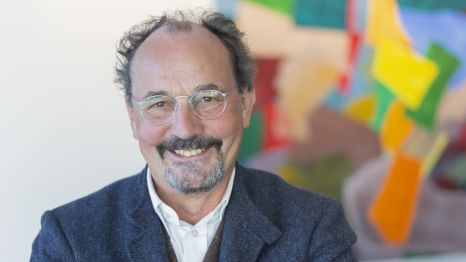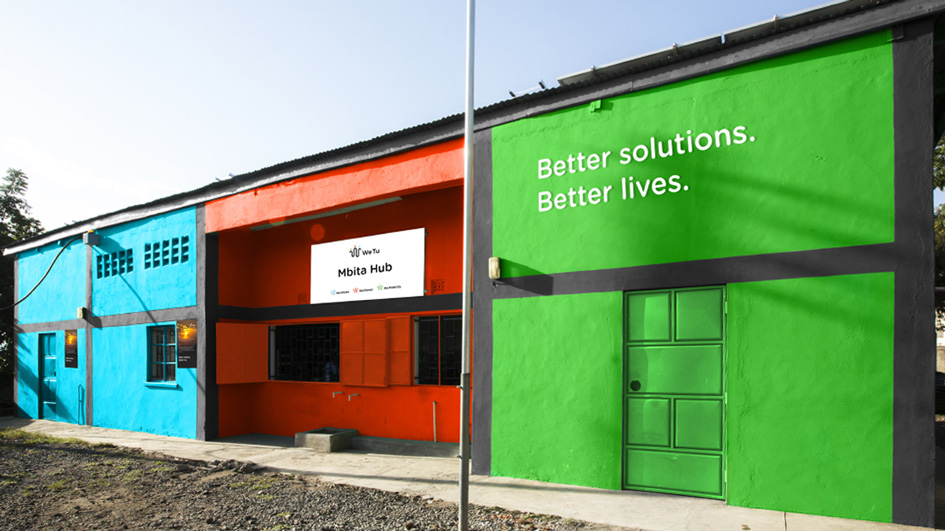
»We are going to see encouraging technological leaps quite soon in East Africa.«
Better living conditions for Kenya
Siemens Stiftung has established WE!Hub Victoria Ltd in Kenya. The social enterprise will work on innovative solutions related to drinking water and energy supply on the shores of Lake Victoria. In addition, newly-developed electric vehicles will be deployed for the first time in rural Africa. These solutions, along with social and ecological business models, are intended to improve living conditions for locals, create jobs, and establish new economic opportunities.
Why did Siemens Stiftung establish the WeTu social enterprise?
We strongly believe in a business approach: Self-sustaining, environmentally-friendly business models can be used to reach sustainability goals and achieve social development in rural Africa. This is why WeTu is a social enterprise with clear goals pertaining to social, economic, and ecologic interests. The business model is based on technological solutions that have been specifically developed for rural Africa.
According to our experience, self-sustaining and financially independent solutions are possible when ideas of local communities are matched with regional and international networks and knowledge. With the Impact Hub Network, we’ve set up several entrepreneurial centers in African cities. We were actively involved in We!Hub, the previous version of this project on Lake Victoria, meaning we know the region, the communities, and the potential business models quite well.

Based on your experience, how would you describe the situation on the ground?
It’s a bit of a mixed bag on Lake Victoria: on the one hand, we see enormous potential. There are many, highly-motivated young people who want to improve their standing in life. They want to seize opportunities and have a real entrepreneurial spirit.
But on the other hand, there is 20 percent youth unemployment in the region – toxically frustrating for such a young society. Beyond that, access to basic goods is not always guaranteed. The drinking water situation is also dire: many people continue to drink contaminated water straight from Lake Victoria. Pollution threatens the livelihoods of local communities that depend on income derived from fishing in the lake. There is poor infrastructure in rural areas: streets are bad if they exist at all, which creates challenges for transporting goods like food or drinking water. These are large hurdles when it comes to development.
You utilize a wide variety of technologies at WeTu – how were they selected?
The technologies we are going to provide have been carefully checked to make sure they are suited for the needs and conditions on the ground.
For example, the fishing lanterns were developed specifically for WeTu. They are very durable, and their lithium-ion batteries will replace lead batteries and oil lamps that are often used; these are harmful to human health and the environmental health of the lake.
For the water filter, we decided on a product from “Solar Spring,” a spin-off from Fraunhofer Institut. They make robust, low-maintenance water filtration systems specifically for rural developing regions. The system has a four-stage filtration process, making it ideal for consistently providing the best and safest drinking water.
In the e-mobility sector, we are planning on testing a few products. That includes the electric “aCar,” a simple, small electric truck made by the Munich startup “EVUM,” which came from TU Munich. The electric truck will be used to make WeTu water and battery deliveries in remote areas. Electric cargo-bikes from “anywhere.berlin,” a young startup, will be able to take on logistic tasks in agriculture and tradecrafts. Finally, the electric boat motors from “Toqueedo” will drastically reduce pollution on the lake from fishing boats. I am confident we are going to see encouraging technological leaps quite soon in the e-mobility sector of East Africa.
Solar panels that provide cheap, clean, and reliable energy will keep everything charged.
What partners are you working with on the project?
We work with a few technology partners and are also planning on linking up with the local startup scene. This is why we set up the company at the LakeHub entrepreneurial center in Kisumu. Beyond that, we are working on a German-Kenyan research network to accompany the expanding technological infrastructure and to come up with new business models. These could include rental concepts and local value creation for more local production and jobs.
To increase our impact in local communities, we are working with local NGOs, such as the Kwaho organization in the WASH sector. Their activities include Hygiene Promotion with schools and health officials.
A network tends to be more innovative, and members can learn from one another. We can also share what we’ve learned working on the ground with our partners and the countless social entrepreneurs in our global empowering people. Network. This is how progress is made, and we need new ideas in development collaboration.
What does the future look like for WeTu?
Initially, we are focusing on expanding the core business areas of energy and water, WePower and WeWater. Then we want to add WeMobility, expanding e-mobility solutions until it includes local production.
The goal remains to use reliable products and excellent service to provide better basic services for tens of thousands of people and families. It is also important that we contribute to improved environmental protection, and WeTu will help reduce water and air pollution.
In the future, the technological solutions we are providing will be well-suited for local production. By shifting the value creation to the local level as much as possible, many new jobs will be created.
Since we work so closely with our partners, in the future we hope to see stronger networking with the public sector as well as additional organizations and businesses with local or international experience.
Is it easy for a German foundation to establish a social enterprise in Kenya? How did you accomplish this?
Siemens Stiftung established WE!Hub Victoria Ltd. and acquired the property, buildings, and technical infrastructure of the previous WE!Hub project. Siemens Stiftung provided WE!Hub Victoria Ltd. with the funds necessary for the initial investments in the form of a low-interest loan.
We coordinated with our German Tax Office and local officials and decisionmakers on setting up this model to create a full subsidiary of our foundation. This was a new experience for us, and the new knowledge is something we will be able to share with other foundations, nonprofits, and social enterprises. We hope that our own actions will contribute to more impact in the social sector.
May 2019


